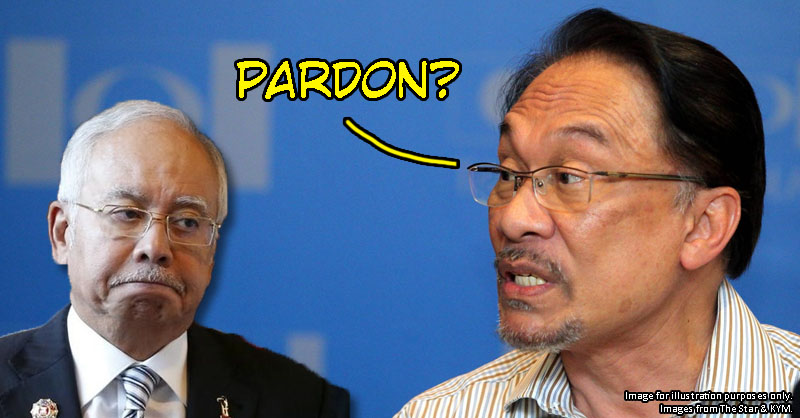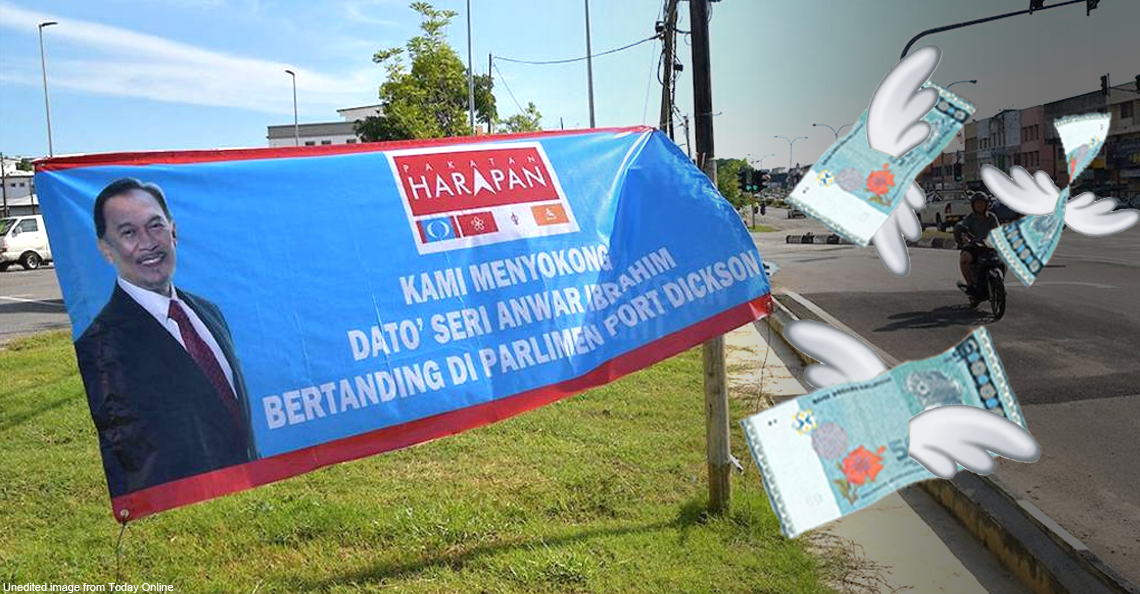There’s a proposal to amend the Dewan Bahasa Pustaka Act. Is this an end to Bahasa Wicet?
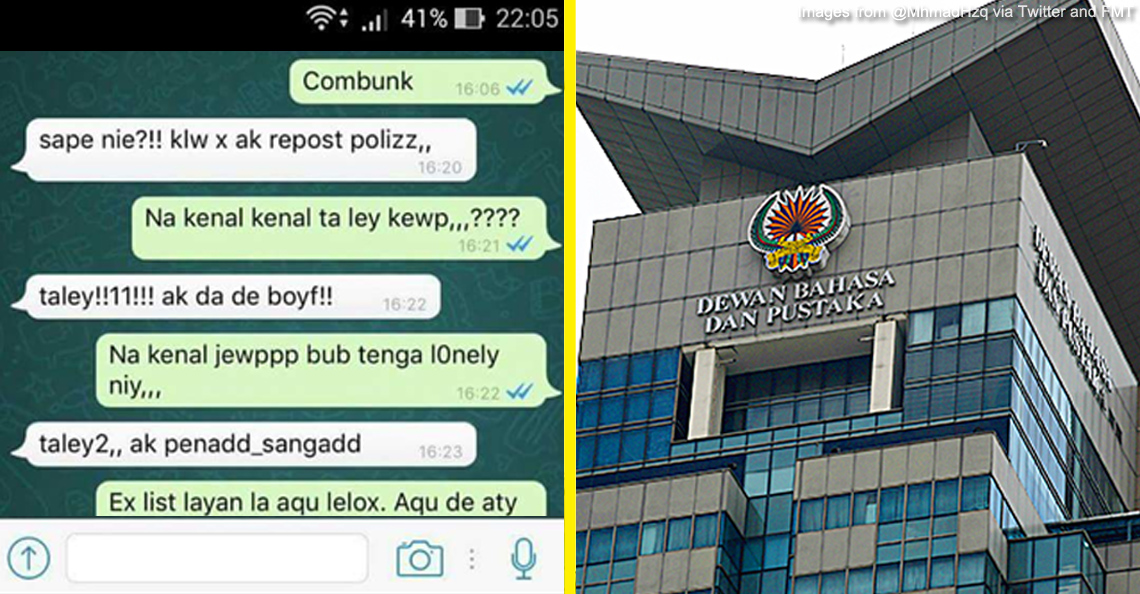
- 1.2KShares
- Facebook1.2K
- Twitter1
- LinkedIn3
- Email4
- WhatsApp10
If you’ve spent enough time online, you may have seen (or used) words like ‘aq’, ‘xde’ and ‘ko’, among other short forms. These words are commonly known as the Bahasa Wicet and it may be among the worst use of the Malay language you can find online.
A more casual use of the Malay language can be seen in the articles written by our sister site, SOSCILI, when they use words like ‘korang’…
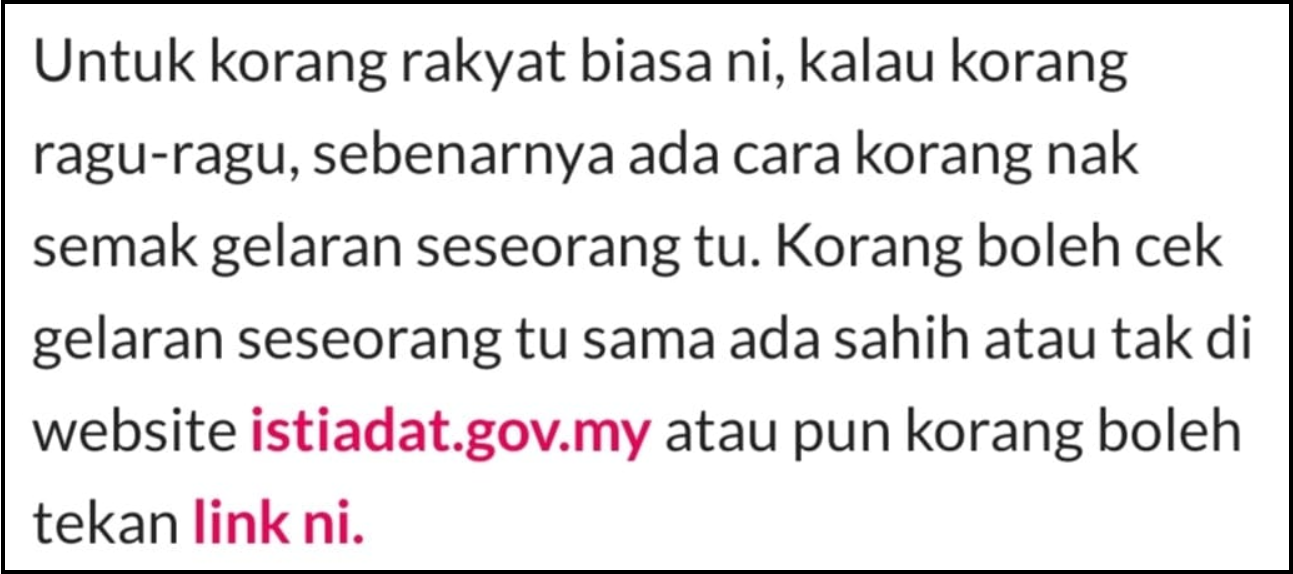
And you may also have seen pictures of signboards like these being circulated around…
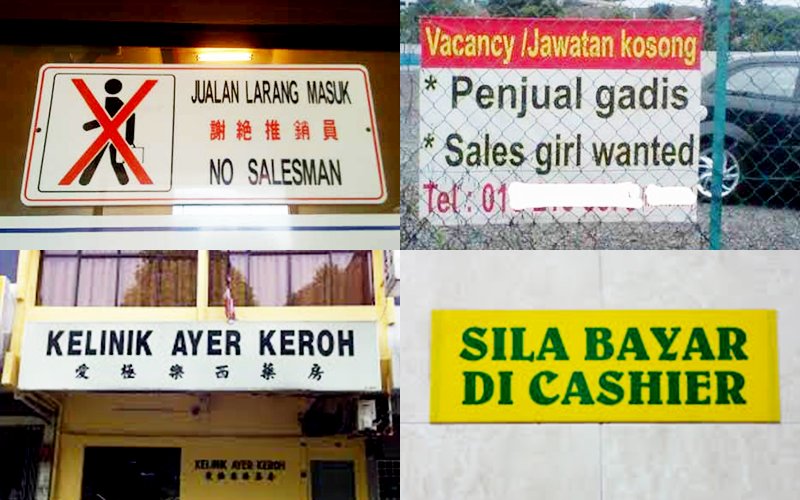
Although these may seem hilarious to a certain extent, the incorrect use of the Malay language may get some people in trouble. Just in case you don’t know the Malay language is protected under several laws such as the Federal Constitution and National Language Act 1963/67 because it is the official national language.
In fact, there is a statutory body, Dewan Bahasa dan Pustaka (DBP), that serves the purpose to protect the language itself by encouraging the proper use of the language. However, DBP’s current role under the Dewan Bahasa dan Pustaka Act 1959 may be a bit restricted (we’ll explain why in a bit).
This may be why it is urging the govt to amend the existing Dewan Bahasa dan Pustaka Act 1959. This new proposed amendment will apparently give the statutory body the power to not just regulate the use of the Malay language but also the power to enforce the proper usage of the Malay language.
In addition, some parties like the Malaysian Translations Association (PPM), who supported the move, reportedly hoped the proposal would allow DBP take legal action against those who do not respect the national language.
Having said that…
OMG, are you gonna be in trouble for using Bahasa Wicet???
TLDR: Not really unless you’re responsible for putting up signboards
As we mentioned earlier, the incorrect use of the Malay language may get some people in trouble. And when we say incorrect use of the Malay language, we meant making mistakes in terms of…
- Spelling
- Grammar
- Mixing two or more languages in a sentence (err… yes, just like what we kadang-kala do at CILISOS)
- Translating words wrongly
And one of these people we’re talking about are those who are responsible for making or putting up signboards in public. This is because they are tied to by-laws of that area. A quick search brought us to several by-laws such as those used in Padang Terap, Kedah and Subang Jaya, Selangor.

But that’s not all. In the Subang Jaya by-laws, for instance, those responsible for signboards with grammatical errors or incorrect use of the Malay language may be fined RM2,000 or face a one year jail term or both. This legal action would obviously be taken if they don’t change their signboards after being given a notice by local council officers.
However, that’s just that. Although our sister site have been using the word ‘korang’, which does NOT even exist in the DBP’s dictionary, theymay not be penalised by DBP under any current law considering how we weren’t able to find any law that penalises the media for using a language incorrectly. But we’re pretty sure there are plenty of Grammar Nazis (yes, we’re looking at some of you o_O) out there waiting to reprimand media outlets for any grammatical errors made in their contents.
And as for the rest of you out there who use Bahasa Wicet, we’re pretty sure you won’t kena anything as well because, at the time of writing, DBP can’t take any legal action against those who disrespect the language. This may be why DBP wants to amend the Dewan Bahasa dan Pustaka Act because…
DBP can only REPRIMAND those who use the Malay language incorrectly
Before we get to the current roles of DBP and how the statutory body feels restricted to do anything, allow us to give you a clearer picture as to why DBP wants more autonomy to regulate the use of the Malay language.
Firstly, the Malay language is considered Malaysia’s national language under the Article 152(1) of the Federal Constitution. The Parliament later enacted the National Language Act 1963/67 that states that the Malay language should be used for all official purposes (read: anything related to the Federal or state govt and public authority)

Despite that, according to DBP’s Head Director, Datuk Abang Salehuddin Abang Shokeran, there are instances where English words were adapted into the Malay language and are used in formal govt events.
“There have been official government events with English names such as the Food Bank programme when there is a Malay term for that, which is ‘Bank Makanan’.” – Abang Salehuddin to Astro Awani. Translated from BM.
What he said may be true considering what we found online…
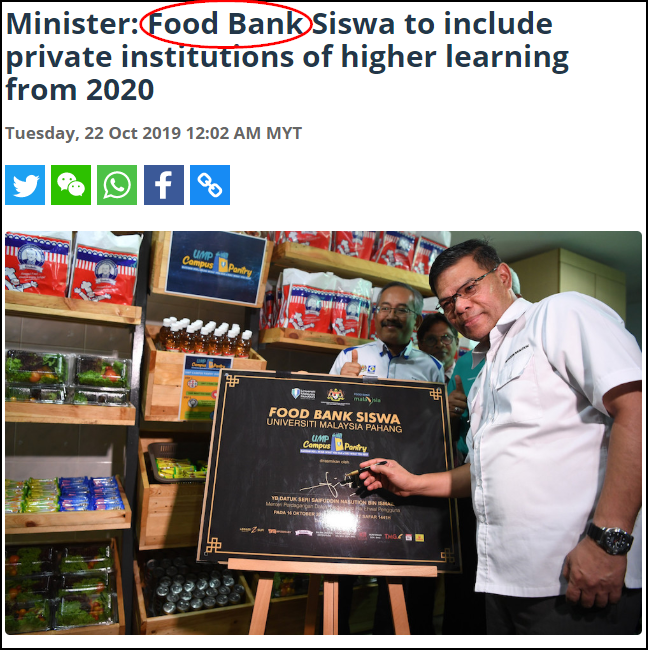
But this issue can be traced waaaaaaayyyyy back to 2006. We’re pretty sure it can be traced way back than that but we’re specifically pointing out 2006 because that was when the DBP Act 1959 was amended.
And this amendment came after many English words have been adapted and absorbed into the Malay language, especially in the academic field.
“It is worse in science as we are still using both BM and English so sometimes you are not sure if there are BM equivalents of the scientific terms. Most of the time, my friends and I just hentam (guess) and end up inventing new BM terms.” – Danica Wee, Universiti Putra Malaysia student in 2006 told The Star.
She may be right anyways and if you don’t believe us, we’d suggest you to take a quiz on this by clicking here.
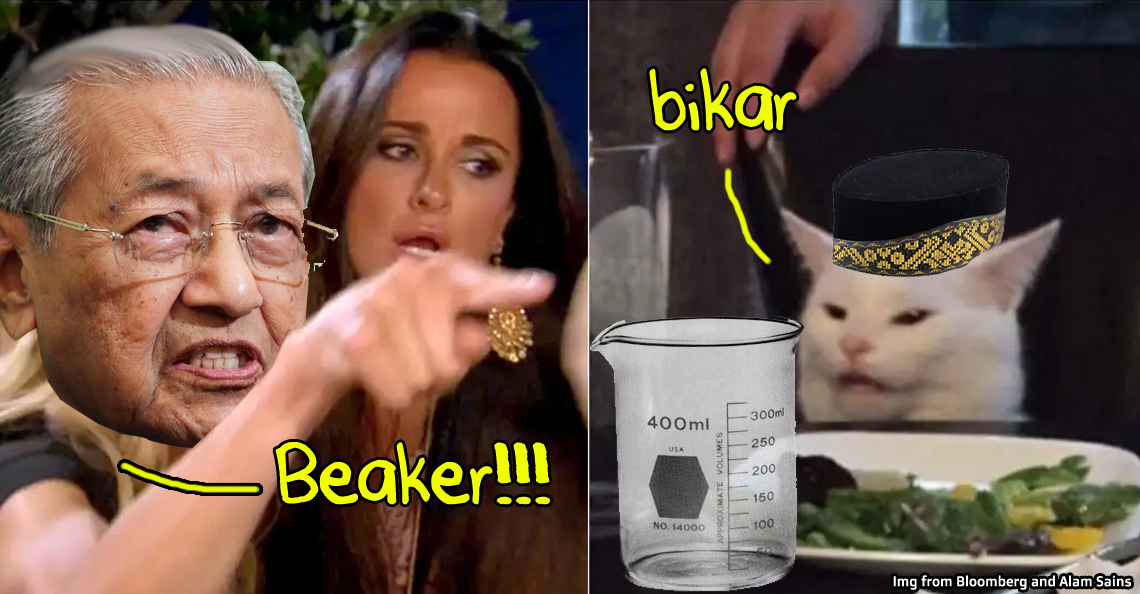
So, this was why the Education Ministry and Culture, Arts and Heritage Ministry presented to the Cabinet an amendment to the Dewan Bahasa dan Pustaka Act to give DBP the power to standardise the Malay language. The amendment was passed and, under the current Act, DBP is responsible to…
- Enrich the national language in all field
- Develop literature talents
- Print, publish or assist in the publication of books, magazines, brochures and other forms of literature in the national language and other languages
- Standardise spellings and pronunciations besides forming suitable terms in the Malay language
- Encourage the correct use of the national language
- Encourage the usage of national language according to the law
Despite this amendment, DBP still has limited power to do many other things. So, this time around, DBP brought forth three suggestions in the proposed amendment…
- The autonomy in enforcing the proper use of the Malay language
- Empower DBP’s role internationally
- Allowing the statutory body to form a business organisation without any restrictions
“Under this amendment, DBP would be able to take effective measures to any disobedience, ignorance or reluctance of some parties who disrespect the Malay language as the national language.” – Abang Salehuddin to Berita Harian. Translated from BM.
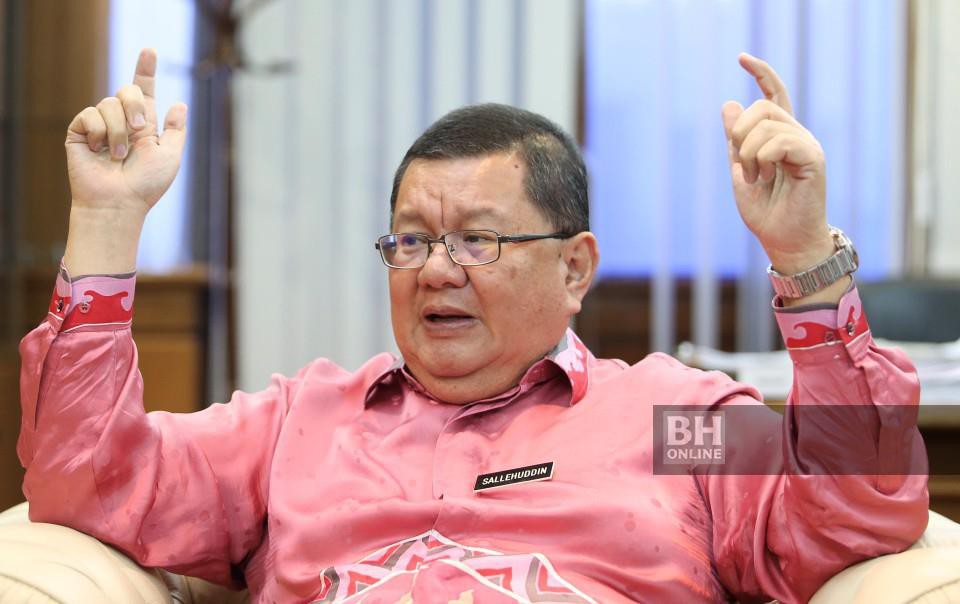
He also added that DBP’s current method to reprimand those who disrespect the language can no longer be used as it is not really effective.
So, will you or even our sister site be in trouble for using the Malay language incorrectly under this proposed amendment? Well, not really.
While we’re still waiting for an exact response from DBP on this, we weren’t able to find any report stating that DBP would be able to take legal action under this proposed amendment.
At the end of the day, preserving the national language may have its own importance and…
Malaysia isn’t the only country to have regulations to protect its national language
While researching for this story, we discovered that Malaysia isn’t the only country with regulations that protect the national language.
Just like our country, Indonesia’s Second Amendment to the Constitution also states that the Indonesian language is the official national language of Indonesia. But the republic’s law may be a bit more stringent than Malaysia in the usage of the language as all transactions and commercial documents should be in the Indonesian language as well.
Besides Indonesia, the United States (US) also has regulations to protect the Native American language. But don’t get us wrong. The US does not have an official language although there have been attempts to make the English language the country’s official language.

The Native American Languages Act of 1990 is simply a law to preserve and protect the indigenous languages that may have gone extinct.
However, we weren’t able to find specific laws that regulate statutory bodies that protect specific languages in a country.
Coming back to Malaysia, DBP’s proposal to amend the Dewan Bahasa dan Pustaka Act has yet to be approved. But, as we mentioned in the intro, it seems like some organisations such as the Malaysian Translators Association (PPM) is showing their support towards this proposal.
“Law enforcement is one of the measures to regulate and ensure the correct use of the language, as well as to raise awareness in a multiracial society about the existence of the national language as enshrined in the Federal Constitution.” – PPM in a statement, excerpt from Malay Mail.
But how far is this true? Well, only time will tell if implementing such a measure would actually help regulate and enrich the use of the national language among Malaysians.
- 1.2KShares
- Facebook1.2K
- Twitter1
- LinkedIn3
- Email4
- WhatsApp10


